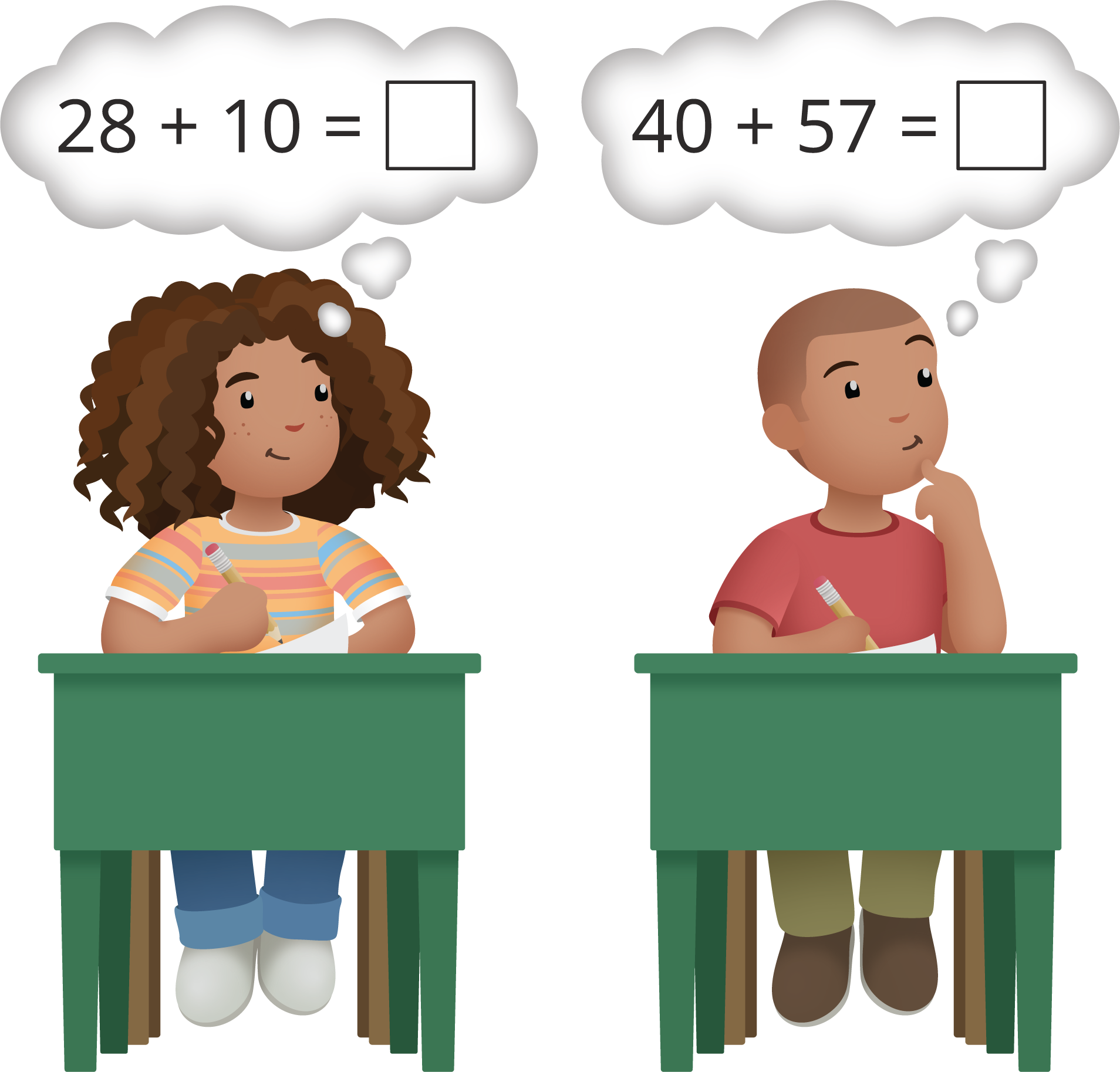Lesson 11
Add Tens to Two-digit Numbers
Warm-up: True or False: Tens and Ones (10 minutes)
Narrative
The purpose of this True or False is to elicit insights students have about adding two-digit numbers using place value understanding. This will be helpful later when students add a two-digit number and a multiple of 10.
Launch
- Display one statement.
- “Give me a signal when you know whether the statement is true and can explain how you know.”
- 1 minute: quiet think time
- Share and record answers and strategy.
- Repeat with each equation.
Student Facing
Decide if each statement is true or false.
Be prepared to explain your reasoning.
- \(80 + 5 = 5 + 80\)
- \(70 + 1 = 80 + 1\)
- \(20 + 6 = 6 + 30\)
Student Response
For access, consult one of our IM Certified Partners.
Activity Synthesis
- “How can you use what you know about tens and ones to reason about the equations?” (Two numbers are not equal if the number of ones is the same but the tens is different.)
Activity 1: Add Two-digit Numbers and Tens (20 minutes)
Narrative
The purpose of this activity is for students to add multiples of 10 and two-digit numbers in a way that makes sense to them. Students may use connecting cubes in towers of 10 and singles. They represent their thinking using drawings, numbers, or words. Some students may make base-ten drawings to show the addition, while others may find the sum mentally, applying what they have learned about place value in previous lessons. Some students may use both methods, depending on the numbers in the problem.
Required Materials
Materials to Gather
Launch
- Groups of 2
- Give students access to connecting cubes in towers of 10 and singles.
Activity
- Read the task statement.
- 10 minutes: partner work time
- Monitor for students who find the sum of 30 + 65 by:
- drawing and counting by ten, then one
- count on from 65 by ten: 75, 85, 95
- combine 3 tens and 6 tens, then add 5 ones
Student Facing
Show your thinking using drawings, numbers, or words.
- \(37 + 20 = \boxed{\phantom{\frac{aaai}{aaai}}}\)
- \(60 + 23 = \boxed{\phantom{\frac{aaai}{aaai}}}\)
- \(48 + 50 = \boxed{\phantom{\frac{aaai}{aaai}}}\)
- \(\boxed{\phantom{\frac{aaai}{aaai}}} = 54 + 20\)
- \(30 + 65 = \boxed{\phantom{\frac{aaai}{aaai}}}\)

Student Response
For access, consult one of our IM Certified Partners.
Activity Synthesis
- Invite previously identified students to share.
- “How are these methods the same? How are they different?” (They all added tens to tens. Some people started with the first number and other people started with the second number.)
Activity 2: The Missing Digit (15 minutes)
Narrative
The purpose of this activity is for students to use their understanding of place value to make an equation true when a digit in a two-digit number is “missing.” Students consider the values of the digits in order to justify their thinking. Students may use connecting cubes in towers of 10 and singles, create drawings, or write about their reasoning.
Advances: Reading, Representing
Supports accessibility for: Organization, Attention
Required Materials
Materials to Gather
Launch
- Groups of 2
- Give students access to connecting cubes in towers of 10 and singles.
Activity
- Read the task statement.
- 10 minutes: partner work time
Student Facing
-
This equation is true.

What digit is under the smudge?
Show your thinking using drawings, numbers, or words. - This equation is not true.

Student Response
For access, consult one of our IM Certified Partners.
Activity Synthesis
- Invite students to share how they determined the missing digit in the first equation.
- Invite students to share how they know the second equation cannot be true.
Lesson Synthesis
Lesson Synthesis
Display \(34 + 40\).
“Today we added tens to two-digit numbers. What do we know about adding these numbers?” (It’s like counting on by tens. You can think of it as 34 and 4 more tens. You can just add the number of tens in each number. For example, 3 tens + 4 tens is 7 tens.)
Cool-down: Add Tens (5 minutes)
Cool-Down
For access, consult one of our IM Certified Partners.
Student Section Summary
Student Facing
We learned that two-digit numbers are made up of tens and ones.

We represented two-digit numbers in many different ways.

6 tens and 5 ones
\(60+5\)
65
We added two-digit numbers by thinking about counting on by 10 or adding more tens.
\(42 + 50 = \boxed{92}\)
